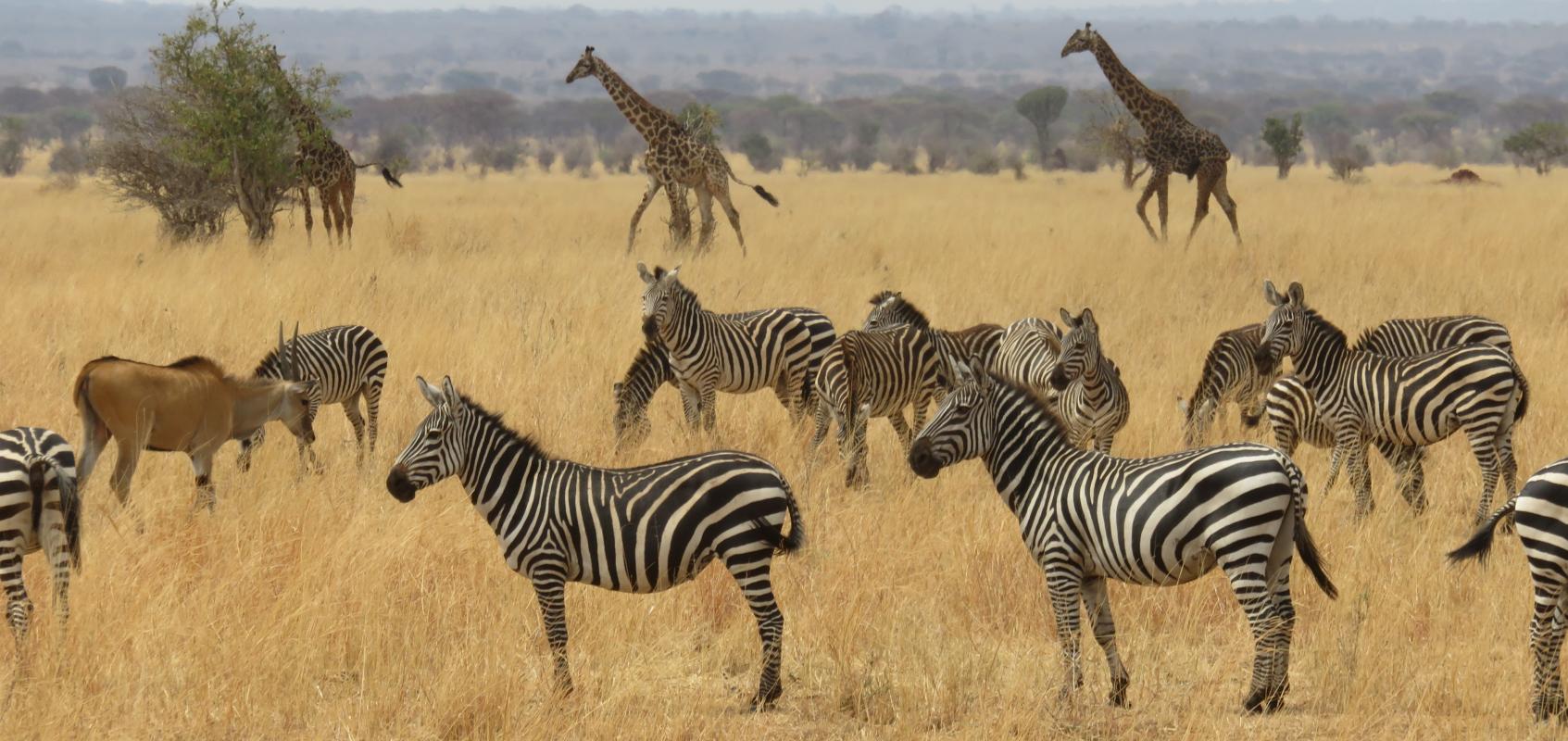
She Learns To Hunt - American Insights, African Applications
23 May 2023
Like many wildlife-loving American women, I had a safari bucket list. It was December 2018, and I was on a journalism fellowship in South Africa. So, I innocently typed “rhino” into Google. On Google Images, a photograph caught my eye. It was of four older white men standing over their harvested rhino, smiling while holding their rifles. An American flag was draped across the rhino’s carcass. I closed my laptop in horror. What kind of person would hunt animals and then brag about it? And who thinks it’s ethically acceptable to even hunt at all? I wondered.
Fast forward 3 years, interspersed with ample time exploring the African veld with hunters and non-hunters alike, and I am now doing a Ph.D. at Cornell University in the US. My focus? The human dimensions of the safari hunting industry in Southern Africa. As a social scientist, I study the people who travel to Africa to hunt big game. Some would say it’s ironic; I’m a former vegetarian who never killed an animal before. However, I am now in the middle of a niche elite, male-dominated industry.
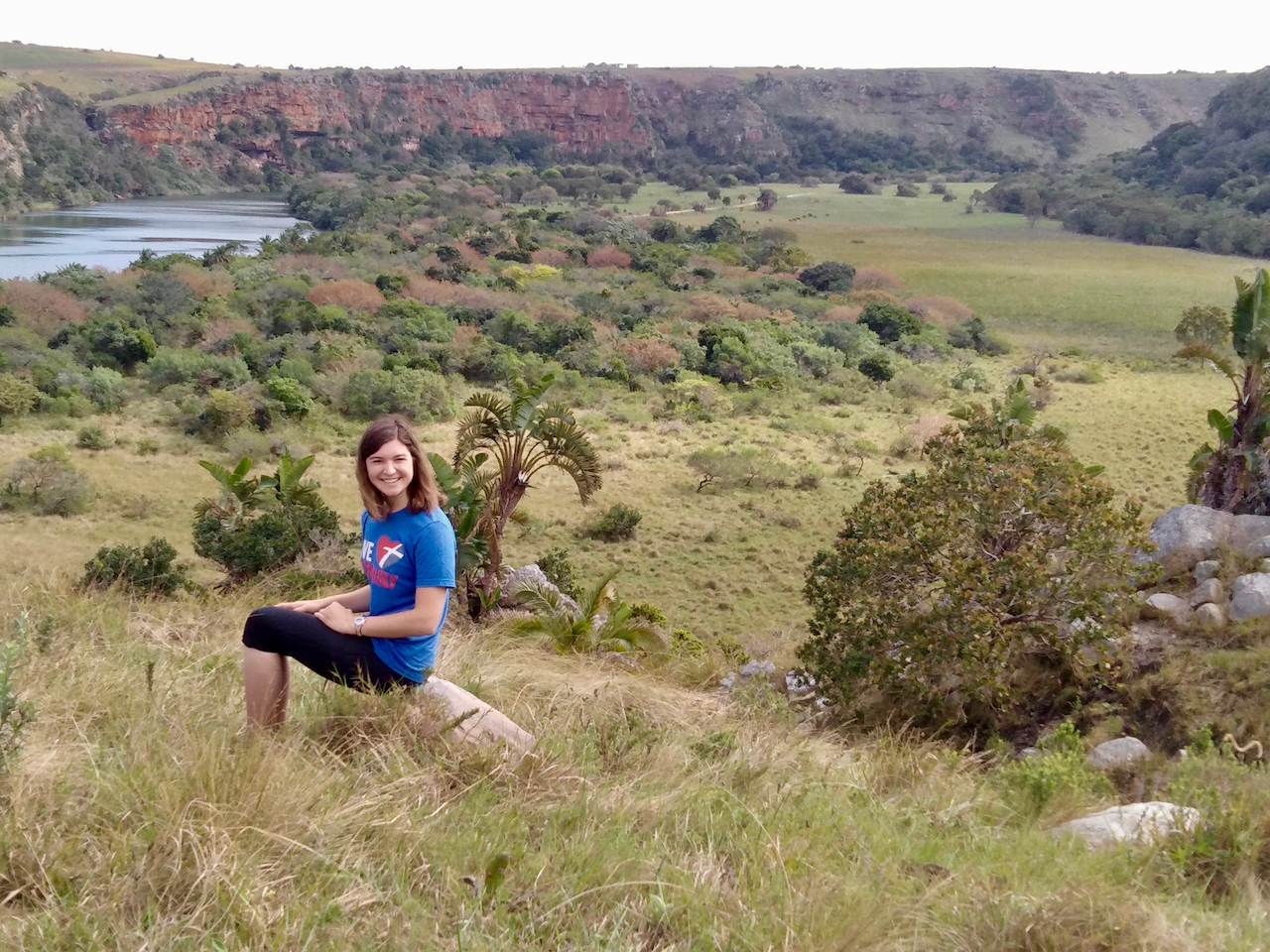
While I may be an unlikely researcher of safari hunting, I have come to appreciate the role that American hunters specifically play in African conservation. The US imports the most hunting trophies of any country in the world. From my own interactions with hunting operators, Americans also appear to constitute the majority of hunting clients to Africa, a statement supported by John Jackson, the president of Conservation Force. Safari hunters often find community in US-based organizations like Safari Club International, Dallas Safari Club, Shikar Safari Club, and Houston Safari Club.
As a whole, safari hunting has played an important role in the African landscape. It has incentivized private landowner and community-led transition to wildlife-based lands in much of Southern Africa. It’s also allowed some indigenous peoples and local communities to practice inclusionary, rights-based approaches to conservation (e.g., CBNRM). Finally, researchers like Lindsey et al. and Musika et al. reveal that safari hunting may field significant anti-poaching resources outside national parks, which Safari Club and Dallas Safari Club foundations equally demonstrate. Thus, decreases in hunting demand could spell negative conservation outcomes for African wildlife and the people who live with it.
Temporary US import bans of trophies from Zimbabwe and COVID-19 travel restrictions demonstrate what can happen when hunting dollars don’t come. However, little research has been done yet to understand American hunters and the sub-set that decides to travel to Africa to hunt. As a part of my research and to understand what I’m researching, I decided to learn to hunt.
In November 2021, I joined a 2-day intensive hunter recruitment-retention-reactivation (R3) program through the Delta Waterfowl University Hunting Program in New York State. Delta Waterfowl hosts one of hundreds of American R3 programs, which seek to meet a daunting reality: the proportion of American hunters has been declining since the 1980s. In the US, hunting and conservation funding strongly intertwine.
Passed in 1937, with many subsequent revisions, the Pittman-Robertson Act (P-R) requires a federal excise tax on guns and ammunition purchases. Collected funds are redistributed to state fish and wildlife agencies based on a formula that accounts for the state’s number of paid hunting and fishing license holders. The state must match P-R contributions at a ratio of 1-3, with most matches coming from the sales of hunting and fishing licenses. While hunting remains a significant source of conservation funding in state fish and wildlife agencies’ budgets, hunting may or may not be a sustainable funding stream. After all, the American public’s values toward wildlife are evolving toward care and concern for individual animals.
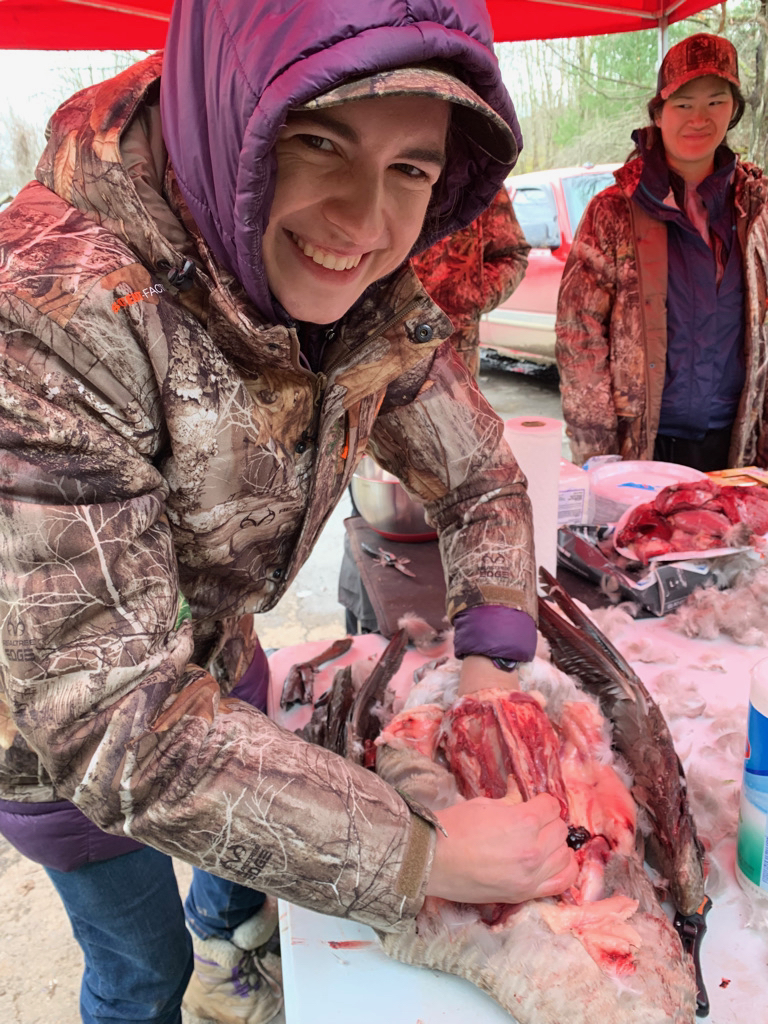
“Course, we’re gon’ eat ‘em!”
The southern drawl and defined beard of our Delta Waterfowl lead, Cornell Professor Dr Orin Robinson, make him stand out here in upstate New York. “If Delta doesn’t let us cook the ducks and geese we shoot, we’ll cook at my house! Gotta lotta good recipes,” he chuckles, nodding at me and the 8 other young hunters-to-be.
“Game stew, burgers, roast, chili poppers, pastrami…” Orin rambles on.
Orin knows his audience well; our Delta Waterfowl group includes 4 men and a whopping 5 women. Women are the fastest-growing shooting sports demographic in America, despite only making up 10% of all hunters. Women may also be more likely than men to be motivated by meat when deciding to take up hunting (see research from New York State and South Dakota).
Listening to Orin, I nod my head, thinking of my efforts to eat local and ethically sourced foods. I was regularly visiting local farmers’ markets and had even started calling myself a “locavore.” I also know many younger Americans—especially women—swear by hunting for meat and sustainability. Backcountry Hunters and Anglers, one of the fastest-growing hunting organizations in the US, has 65% of its members below the age of 45 (meanwhile, 55% of American hunters are 45 years old and older). Their annual Rendezvous gathering brings in famous chefs from around the country to perform cooking demonstrations with all types of game meat. MeatEater is a 12-season TV show depicting Steven Rinella hunting with a variety of guests, where afterward they prepare the harvested meats together. The show attracts latte-sipping progressives from urban areas, many of whom distance themselves from the predominantly conservative, older demographic that safari hunting organizations like Safari Club attract.
Day one of the Delta Waterfowl program begins. On a frigid and rainy November morning, my fellow newbie hunters and I drive to Greene, New York, a farm town with a population of 6,000. On our host family’s back porch, I hold my loaded shotgun for the first time. My female hunting mentor, Shirley, helps me position the gun just right. A machine ejects a clay pigeon into the air. I miss the pigeon by a long shot.
Shirley doesn’t bat an eye. “Follow where the pigeon is going, and shoot just ahead of it,” she tells me. “You’ll get it. Just need more practice.” She hands me more ammo.
“Set your gun not quite at your armpit, but just before your shoulder,” she says another time. She repositions me slightly. I am still a novice at handling guns. Being in a new location and with unfamiliar people makes the experience all the more daunting. But I trust Shirley to guide me.
While women are among the fastest-growing demographics of US hunters, they have faced many gaps in entry into hunting. Precisely because of this, Dr Christine Thomas, a professor at the University of Wisconsin-Stevens Point, established Becoming an Outdoorswoman. The non-profit educational program offers 1-3 day hands-on outdoor skills workshops for adult women in casual, non-threatening environments. It’s now in 38 US states and 6 Canadian provinces and is part of state fish and wildlife agencies’ R3 curriculums. Though not exclusively geared toward females, programs like Delta Waterfowl have also made a point to include opportunities and even requirements for recruits to have female mentorship.
Extrapolating to Africa, the lack of female hunting mentors is even more profound. Becoming an Outdoorswoman offers many outdoor international trips for Americans, but they have yet to have an African hunting one. Delta Waterfowl doesn’t either. Additionally, I have encountered very few female African professional hunters (PHs). PHs lead safari hunting clients from dawn to dusk and are responsible for hunting safety and rules, transport, food, provisions, and entertainment. The question is: would some female safari hunting clients be comfortable hunting with a male PH, especially if they are traveling alone? Otherwise, the female PH options are slim. In Zimbabwe, Tanya Blake is the first and only female PH. In Namibia, there are only 5 female PHs, and in South Africa, there is a handful (depending on whom I ask, I get numbers ranging from 5-10).
Day one ends with a bang – quite literally. “Francine’s first clay pigeon of the day!” Shirley hollers. My classmates clap, then cheer, “Whoop whoop!” Within an hour and a half, all of us newbies go from uncoordinated novices to clay pigeon conquerors.
Day two is when the Delta Waterfowl fun begins. At 3:30 AM, my classmates and I start our drive. The sky begins to brighten as we arrive at a ploughed farm field. We take our guns out of the truck as I follow Shirley into one of the hunting blinds. The blinds are so well camouflaged I didn’t even know they were there.
What becomes of our day? Waiting. Lots of waiting. Also, quietness, stillness, and peace at hearing the sounds of the buzzing insects and chirping robins and blackbirds. Unity with other hunters. We layer and re-layer ourselves, talk about what we love about the outdoors, and sit in solemn reverence as the sun peeps over the distant mountaintops, revealing its initial morning glory.
Now and again, one of the Delta Waterfowl staff spots a flock of geese from afar. “Da-da-da-da. Da-da-da-da-da. Da-da-da.” Our mentors play their goose calls well enough that, two hours in, a flock finally takes notice. It turns toward us, then comes closer. But it’s no use. It sees another nearby flock and turns away. We finish the day without a single shot fired.
Delta Waterfowl knew we might be unlucky. We drive back to the same house we visited for clay pigeon shooting. There, the Delta Waterfowl staff each hand us a dead goose.
“Just in case you guys didn’t get anything today, we shot you some geese,” one says. “It’s important to know how to use the animal.”
I initially wince upon feeling the soft, blood-ridden feathers, the leathery webbed feet, and the small yet delicate head and beak. But then we put it all to good use. The heart, liver, breasts, and legs I learn to cut out for meat.
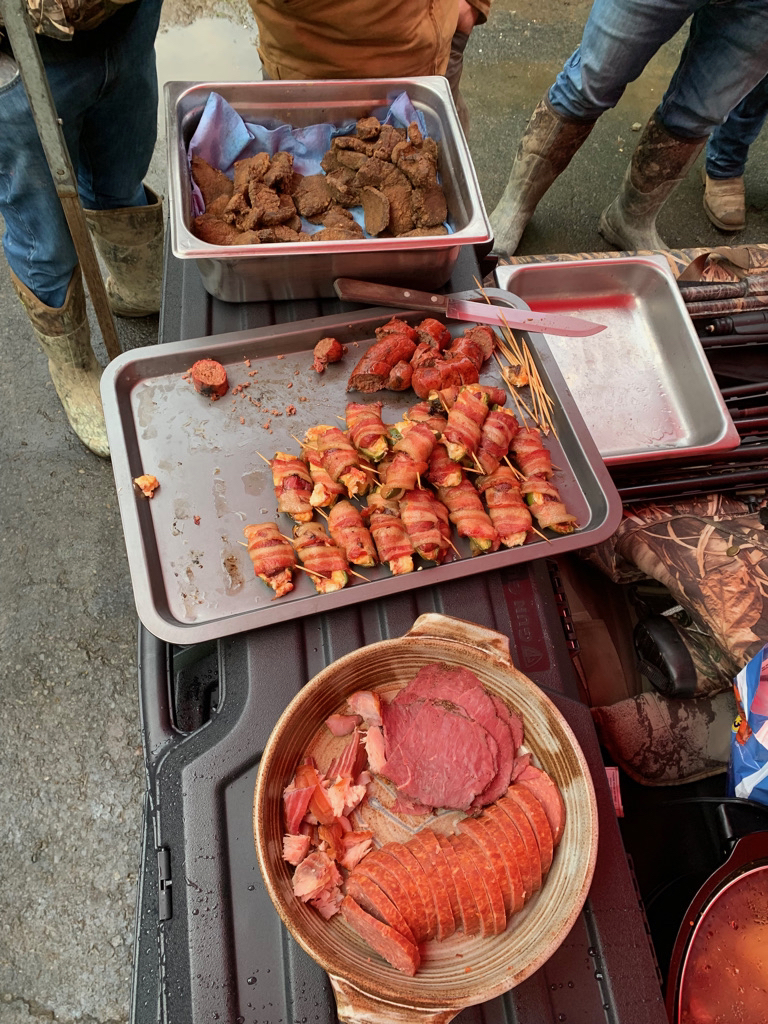
My classmates and I grill the meat, while our mentors have us test out their tried-and-true recipes. That goose meat—along with the bacon-wrapped goose, goose pastrami, and venison chili our mentors had prepared—is among the bests foods I’ve tasted! Unlike in many African countries, purchasing wild game meat is illegal in the US and is only allowed to be distributed informally among friends and neighbours. Interestingly, that is a legacy of the late 1800s to early 1900s, when the Boone & Crockett Club established by President Theodore Roosevelt pushed to ban all “market hunters,” who were overhunting bison and other emblematic North American wildlife due to a tragedy of the commons.
Shirley and the others encourage me to be creative with using the geese, not just for its meat. The feet I employ to make key chains, ornaments, and miscellaneous mementos. The rest of the body my classmates and I leave to safely decompose. It’s a link back to the circle of life and feeds our sustainability inklings. Capping off the day, the Delta Waterfowl staff, with Shirley in tow, give me and my classmates freezer bags full of extra meat to bring home. We wave our goodbyes and I think: What a day!
Looking back on this first hunt, it has transformed me. I have a newfound sense of respect for ethical, sustainable hunting and hunters. I also more deeply appreciate the outdoors and my intrinsic, spiritual connections to it. Nevertheless, I am concerned.
Currently, US state fish and wildlife agencies are caught in a precarious position. Due to decreased hunting dollars from P-R, Colorado removed its invasive species removal program. Vermont went so far as to say that hunting “provides no significant revenue stream to the department.” Other state agencies have looked into alternative revenue-raising sources to Pittman Robertson (e.g., taxing all recreational users) but thus far have been unsuccessful.
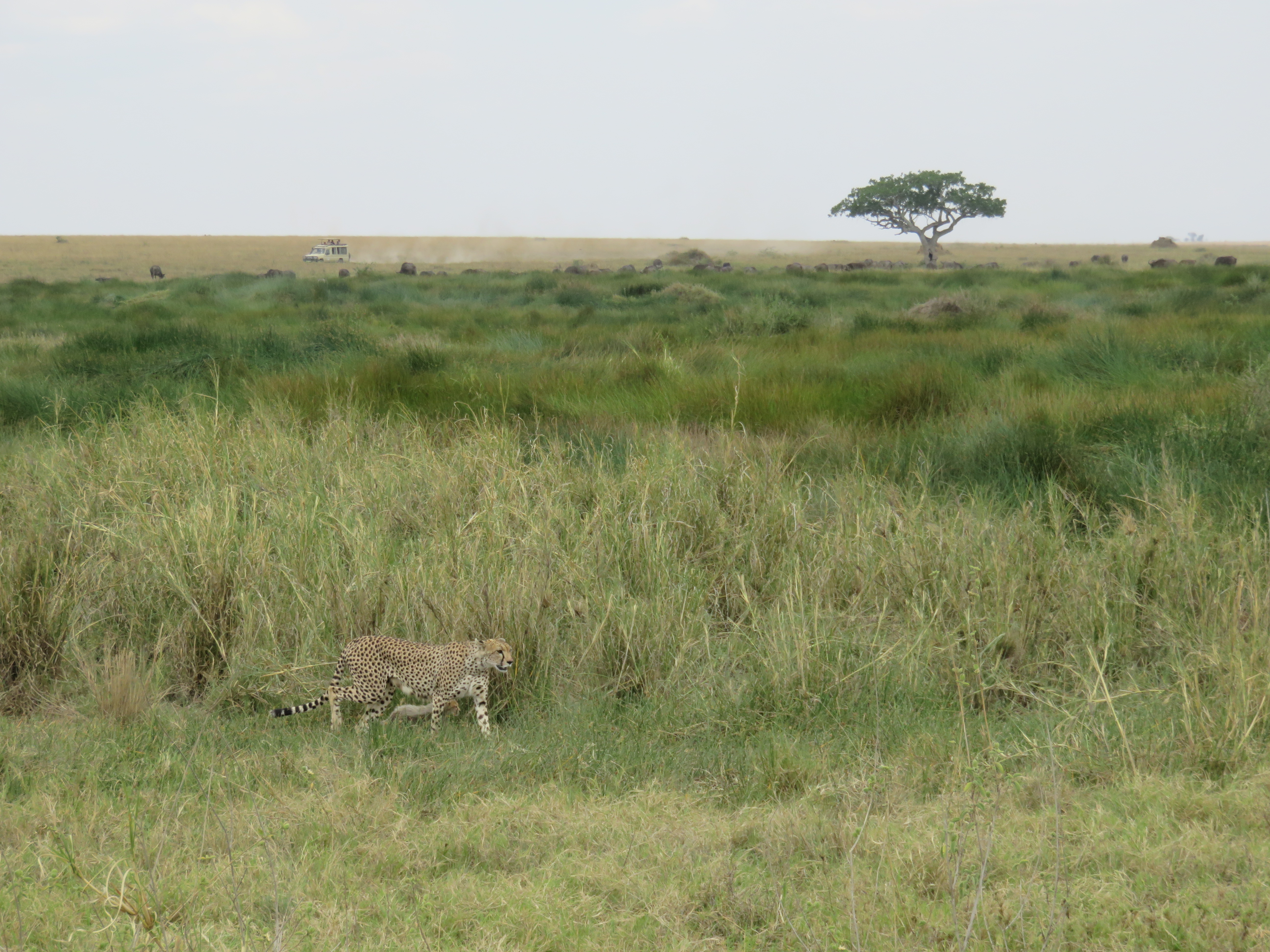
But my concern is not only for the future about conservation funding in America. In the African context, I am left asking:
-
Are media depictions of safari hunting and the safari hunting industry’s marketing about “trophies” and “sport” deterring prospective female and younger American clients, who may have diverse motivations for hunting (e.g., meat, camaraderie, adventure tourism)?
-
How might representation in either/both the American and safari hunting industry affect who decides to participate (e.g., by gender, race, class)?
-
Within Africa, what is the difference between safari hunting, trophy hunting (which I have used synonymously with trophy hunting in this article), and biltong hunting? And are there blurred lines or crossovers between them and those who choose to participate?
Danene van der Westhuyzen is a trailblazer in the safari hunting industry who may provide some answers. An optometrist turned PH and the first ever female dangerous game PH in Namibia, Danene has gone on to be the chairwoman of the Operators and Professional Hunting Associations of Africa (OPHAA), the umbrella group for 14 African states’ professional hunting associations. Her Aru Game Lodges are unique. Clients milk their cows, collect ostrich eggs, hunt (but some don’t), and prepare delicious game meat recipes using all local ingredients. Danene is an award-winning cookbook author. So far, being different is paying off: in 2018, Aru Game Lodges won the Dallas Safari Club’s Outfitter of the Year award.
Danene views safari hunting as a holistic experience, and that the industry—along with its clients—is changing. As a newbie hunter continuing my personal and professional journey, I can’t help but agree. I have since gone safari hunting in Mozambique, and this July and August will be in the field with female and black African PHs to understand ways the safari hunting industry may be evolving from within. The more I learn, the more I realize the amount of research still to be done in this controversial, yet highly impactful, industry.
[Photos by the author]
-

Ms Francine Barchett
Research Associate
We support the free flow of information. Please share:
More content
-

What Foot and Mouth Disease-free means for South Africa’s game meat trade
Ms Lydia Daring Bhebe…Explore the latest developments in South African provinces achieving and maintaining Foot and Mouth Disease (FMD) free status…
Articles -

The world wildlife trade regulator is 50 – here’s what has worked and what needs to change
Daniel Challender…Most countries implement Cites, the Convention on International Trade in Endangered Species of Wild Fauna and Flora as…Articles -

Enabling Sustainable Wildlife Trade
Prof Francis VorhiesEnabling sustainable wildlife trade is a key policy measure for growing Africa's wildlife economy. In this respect, CITES…
Articles -

Has CITES become too complicated to be effective?
Prof Francis VorhiesGovernments agreed to the text of CITES in the 1970s, which is quite straightforward. However, the agreement’s implementation…
Articles -

From poachers to providers: Can Africa's wild meat market save wildlife?
Dr Wiseman NdlovuHave you ever considered how wild meat could be more than just a cultural staple but also a…
Articles -

As a fellow of the African Wildlife Economy Institute (AWEI), I am excited to attend the upcoming 3rd…
Articles -

A theory of change to improve conservation outcomes through CITES
Dr Michael 't Sas-Rolfes…Here we articulate the implied theory of change (ToC) underpinning the design and operation of CITES (Convention on...
2025Research -

Wild Meat Value Chain Integration Systems: Opportunities for Value Chain Formalisation and Scaling in Africa
Dr Wiseman Ndlovu…Establishing a legal, safe and sustainable wild meat sector promises to potentially reduce demand for illegally sourced meat...
2025Research -

AWEI's 2024 Wildlife Economy Dialogue Series
Ms Emily TaylorRediscover 2024: A year of insight and inspiration
In 2024, AWEI proudly hosted three ground-breaking dialogue series in…
Articles
Get updates by email
Through impactful research, stakeholder engagement, and professional development, AWEI is supporting the wildlife economy across Africa. Please subscribe for occasional updates on our work and forthcoming events.
Sign up for a quarterly dose of AWEI insights
In a complex and changing world, AWEI generates strategic ideas, conducts independent analysis on wildlife economies, and collaborates with global scholar-practitioners to provide training and expertise for biodiversity conservation, climate resilience, and inclusive economic opportunities in Africa.
